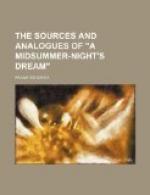Entreat you to permit that we, whom chaste and steadfast love,
And whom even death hath joined in one, may, as it doth behove,
In one grave be together laid. And thou unhappy tree,
Which shroudest now the corse of one, and shalt anon through me
Shroud two, of this same slaughter hold the sicker[7] signs for ay
Black be the colour of thy fruit and mourning-like alway,
Such as the murder of us twain may evermore bewray.
This said, she took the sword, yet warm with slaughter of her love,
And setting it beneath her breast did to the heart it shove.
Her prayer with the gods and with their parents took effect,
For when the fruit is throughly ripe, the berry is bespect[8]
With colour tending to a black. And that which after fire
Remained, rested in one tomb as Thisbe did desire.
* * * * *
ROBIN GOOD-FELLOW; HIS MAD PRANKS AND MERRY JESTS
Not omitting that ancient form of beginning tales, Once upon a time it was my chance to travel into that noble county of Kent. The weather being wet, and my two-legged horse being almost tired (for indeed my own legs were all the supporters that my body had), I went dropping into an alehouse; there found I, first a kind welcome, next good liquor, then kind strangers (which made good company), then an honest host, whose love to good liquor was written in red characters both in his nose, cheeks and forehead: an hostess I found there too, a woman of very good carriage; and though she had not so much colour (for what she had done) as her rich husband had, yet all beholders might perceive by the roundness of her belly, that she was able to draw a pot dry at a draught, and ne’er unlace for the matter.
Well, to the fire I went, where I dried my outside and wet my inside. The ale being good, and I in good company, I lapt in so much of this nappy liquor, that it begot in me a boldness to talk, and desire of them to know what was the reason that the people of that country were called Long-tails[1]. The host said, all the reason that ever he could hear was, because the people of that country formerly did use to go in side-skirted coats. “There is,” said an old man that sat by, “another reason that I have heard: that is this. In the time of the Saxons’ conquest of England there were divers of our countrymen slain by treachery, which made those that survived more careful in dealing with their enemies, as you shall hear.
“After many overthrows that our countrymen had received by the Saxons, they dispersed themselves into divers companies into the woods, and so did much damage by their sudden assaults to the Saxons, that Hengist, their king, hearing the damage that they did (and not knowing how to subdue them by force), used this policy. He sent to a company of them, and gave them his word for their liberty and safe




